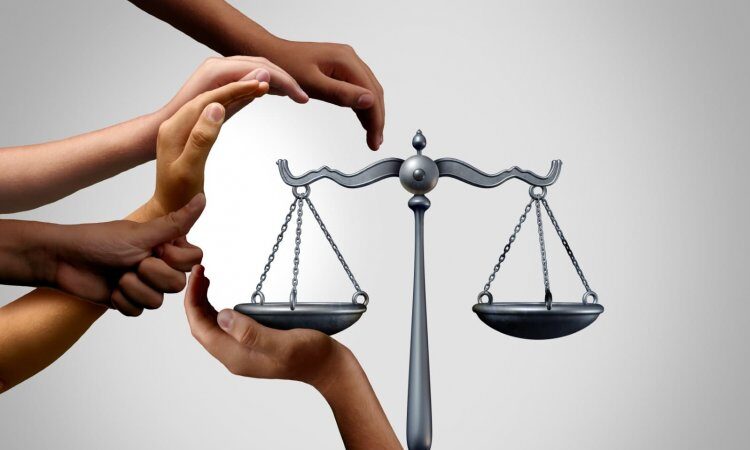
The job of the judiciary is to protect human rights along with the rule of law. But it is extremely worrying that lakhs of innocent people are languishing in jails for many years without any trial or punishment due to political vendetta, government oppression, corrupt governance, black laws, false evidence, false witnesses, poverty, delay in the administration of justice, large shortage of judges in the courts and expensive justice system. But the higher judiciary has never taken any exemplary action against the officials of the governments, police and investigation agencies responsible for this flawed justice system. For the victim, the entire judicial process is like serving a sentence, because even after facing trials for many decades, there is no hope of getting justice. If this is not government terrorism, then what else is it?
The current judicial system is so unequal that the powerful people in the society escape the clutches of the law despite committing all kinds of crimes due to money and government pressure, while the common people continue to rot in jails for years in the hope of justice. It is because of such double standards of justice that the general public of the country is losing faith in the judiciary, for which apart from the governments, the entire judicial system, judiciary, police and investigation agencies are mainly responsible. In the past, in an attempt to take up high constitutional positions after their retirement, many judges have been seen giving decisions in favor of the governments, which have proven to be extremely fatal for democracy and secularism.
Many renowned intellectuals, lawyers, journalists and social activists of the country have been languishing in jails without any trial for the last 6 years under false charges of sedition in the alleged violence case of Bhima Koregaon, against whom no charges of sedition have been proven till date, but under pressure from the central government, the judiciary is repeatedly refusing to grant them bail. Such illegal detention is a direct violation of the rights to life and personal liberty granted to citizens under Article 21 of the Constitution. Apart from this, 17 people including student leaders Umar Khalid, Gulfisha Fatima, Sharjeel Imam, Abdul Khalid Saifi, Miran Haider, Tahir Hussain, Mohammad Salim Khan, Azhar Khan, Salim Malik, Sifaur Rehman, Shadab Ahmed, who were arrested by the Special Cell of Delhi Police in false cases for instigating communal riots in Delhi in February 2020 during the Shaheen Bagh agitation against the Citizenship Amendment Act, have been detained in jails without any trial for the last 4 years. Against whom the investigating agencies have neither proved any charges nor are they being released on bail.
The bail application of JNU student leader Umar Khalid, arrested on September 13, 2020 under UAPA, has been rejected 3 times and the hearing has been postponed 14 times. There are 460 witnesses in his case and a 30,000-page charge sheet has been filed along with 4 supplementary charge sheets. This case is also likely to go on for many years, although he cannot be kept in jail for a long time. In an article in the New York Times, journalist Suhasini Raj has put Indian democracy, media, communal politics and the Indian judicial system on the dock for Umar Khalid’s 4-year detention. Social activist Gulfish Fatima was also arrested under the UAPA in connection with the Zafarabad riots. Her bail application has been presented for hearing 65 times in the Delhi High Court. Every time the decision to grant bail is postponed on some pretext or the other during the hearing of these two cases. There is no judge, no public prosecutor, no complete documents, no supplementary charge sheet, no new bench of judges, no reserving of the verdict after the hearing, then transferring the same judge and hearing again by a new bench, etc. Every effort is being made to deliberately keep these two and others in jail for a long time by delaying the court process. Prof. G. N. Saibaba of Delhi University, who is 90 percent physically disabled and suffering from several serious diseases, was detained in the Anda cell of Nagpur Central Jail without any bail for 10 years on the charge of alleged links with Maoists. The jail administration did not provide him with any medical treatment nor did the judiciary ever grant him bail on medical grounds. Although the Supreme Court had acquitted Saibaba and five other social activists on March 8 this year and released them unconditionally, he died on October 12 after undergoing a simple gallbladder surgery due to inhumane treatment and illness by the jail administration.
In addition, priest and social activist Stan Swamy (84) kept pleading with the judiciary for bail despite his serious illness, old age and innocence, but the judiciary did not listen to him and he died in judicial custody on July 5, 2021. Similarly, social activist Pandu Narote also died in jail due to illness. If the above social activists had been released on bail in time, their lives could have been saved. In addition, to suppress voices of dissent, Alt News founder Mohammad Zubair, Kerala journalist Siddiqui Kappan, NewsClick editor Prabir Purkayasath, advocate Teesta Setalvad etc. were detained in jail for many months without any trial. In stark contrast, BJP MP Sadhvi Pragya Thakur, Colonel Purohit, Swami Aseemanand, accused of terrorist incidents of RSS-related bomb blasts, have been out on bail for many years despite being proven guilty. Even from the BJP








